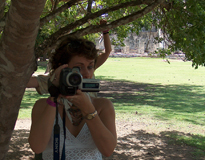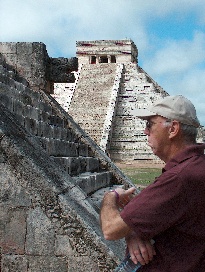 |
 |
OSEA Publications OSEA Programming OSEA Research Workshop OSEA Image Galleries OSEA Online Library OSEA News & Updates
|
 |
|
|||||||||||||||||||||||
|
OSEA Panel at the 2010 Meetings of the Society for Applied Anthropology Panelists include 2009 Field School participants Sarah, Linsey and Justin will be panelists on a session in the 2010 Meetings of the Society for Applied Anthropology to be held March 24-27 in Mérida, Yucátan, México. They give papers based on their research conducted in the 2009 OSEA Field School. The discussants for the panel are Patricia Fortuny Loret de Mola, social anthropologist at CIESAS-Mérida and OSEA Associate, and Tim Wallace, anthropologist at NCSU and Director of the Ethnographix Field School in Guatemala. Sarah TAYLOR (SUNY-Albany) is organizer of the panel: "Tradition, Tourism, and Community in Yucatán, Mexico: Reports from the Ethnographic Field School of the Open School of Ethnography and Anthropology (OSEA)"
Sarah Block (American University)
Linsey Cory
(Grand Valley State University) Justin Quinn
(New College of Florida) DISCUSSANTS:
Quetzil Castaneda and Jennifer Mathews, an archaeologist at Trinity University, who works in Quintana Roo, have also organized a panel for the 2010 Applied Anthropology Meetings. Panelists include: Allan Maca, Juan Castillo Cocom, Lisa Breglia, Chip Colwell-Chanthophonh, Dominique Rissolo, Jeffrey B. Glover, and Carmen Varela. Session Title: Ethnographic Archaeology: Emergent Collaborations between Archaeologists and Ethnographers.
2. Carmen Varela Torrecilla Applying Precolumbian Ceramic Archaeology with contemporary Maya potters in Yucatán: Aplicando la Arqueología Prehispanica con los Alfareres Mayas de Yucatán. In the course of over 20 years of research on pre-Columbian ceramics of Yucatán, I initiated ethnographic research with contemporary potters. Initially, I used interviewing and observation to investigate contemporary sources and technologies to better understand the pre-Columbian ceramics. Now I am doing “applied archaeology” by sharing my knowledge with pottery makers in different communities in the region as a way to help them recuperate and reinvent their artistic tradition and cultural heritage. This paper presents aspects of this collaboration with Maya ceramicists and research, especially focusing on issues of trans-disciplinary research in an applied or “action research” context. 3. Allan Maca (Colgate University) and Gregorio Perez Martinez (PAPAC, Copán) Copán at the Crossroads: Ethnographic Urgency and the Archaeology of Globalization. This paper addresses two current realities of living in and doing archaeology at Copán, Honduras: 1) changes to public health as a result of archaeotourism; 2) destruction of archaeological sites due to looting and urban expansion. The Copán Urban Planning Archaeological Project (PAPAC) addresses these realities with a pilot ethnographic study that: 1) examines community health trends and local and national care options, and 2) collaborates with an indigenous sub-community to understand their health issues as well as their attitudes regarding the protection of surrounding ruins and the role of the ruins in ongoing struggles for group identity.4. Quetzil E. Castañeda (OSEA and Indiana University) Constructing the Past, Making History: Notes on the Lived Historical Value of Archaeology and the Significance of Autoethnographic Documentation of Archaeological Projects This paper discusses how archaeological research projects have an experiential meaning and historical value for the persons and communities involved in archaeology. In other words, archaeology “makes history” in the present in and through the relationships it creates with communities. Recognition of this fact creates the scientific imperative that archaeologists figure out ways to start conducting ongoing ethnographic documentation of the social contexts of their research projects. This paper presents concrete ways that archaeologists might actualize such autoethnography or "self"-ethnographic and historical documentation. 5. Chip Colwell-Chanthophonh (Denver Museum of Nature and Science) From Archaeology to the Anthropology of Place: Lessons from Traditional CulturalProperties Research Ethnographic research is a vital methodology in the identification and documentation of traditional cultural properties as part of the National Historic Preservation Act of 1966. Drawing from applied research with the Hopi Tribe, I argue that this approach to historic properties provides a robust model for all archaeologists, expanding the discipline’s domains of historical knowledge and shifting its ethical grounding. At the core, this approach considers ancient places anthropologically, illuminating how the cultural practices and beliefs of living communities root their histories and identities in sites of memory. 6. Discussant: Lisa Breglia 7. Discussant: Juan Castillo Cocom
|

